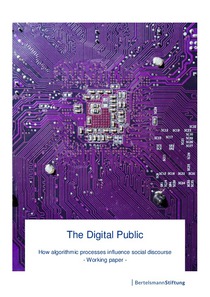The digital public. How algorithmic processes influence social discourse
"Essentially this paper answers three key questions relating to public communication and opinion in the digital age: 1. Media transformation: How is public discourse changing because of the new digital platforms through which many people now receive socially relevant information? When all age...
| Main Authors: | , |
|---|---|
| Institution: | ETUI-European Trade Union Institute |
| Format: | TEXT |
| Language: | English |
| Published: |
Gütersloh
2017
Bertelsmann Stiftung |
| Subjects: | |
| Online Access: | https://www.labourline.org/KENTIKA-19287314124910055969-The-digital-public.-How-algori.htm |
| _version_ | 1771659898661109760 |
|---|---|
| author | Lischka, Konrad Stöcker, Christian |
| author_facet | Lischka, Konrad Stöcker, Christian |
| collection | Library items |
| description | "Essentially this paper answers three key questions relating to public communication and opinion in the digital age:
1. Media transformation: How is public discourse changing because of the new digital platforms through which many people now receive socially relevant information? When all age groups are considered, intermediaries driven by algorithmic processes, such as Google and Facebook, have had neither a large nor defining influence on how public opinion is formed, compared to editorially driven media such as television. These intermediaries judge the relevance of content based on the public’s immediate reaction to a much greater degree than do traditional media.
2. Social consequences: In terms of quality and diversity, is the information that reaches people via these new channels suitable for the formation of basic democratic attitudes and does it promote participation? Use of these intermediaries for forming public opinion is leading to a structural change in public life. Key factors here are the algorithmic processes used as a basic formational tool and the leading role that user reactions play as input for these processes. Since they are the result of numerous psychological factors, these digitally assessed and, above all, impulsive public reactions are poorly suited to determining rele-vance in terms of traditional social values. These values, such as truth, diversity and social integration, have served in Germany until now as the basis for public opinion and public life as formed by editorial media.
3. Solutions: How can the new digital platforms be designed to ensure they promote participation? Algorithms that sort content and personalize how it is assembled form the core of the complex, interde-pendent process underlying public communication and the formation of public opinion. That is why solutions must be found here first. The most important areas that will need action in the foreseeable fu-ture are facilitating external research and evaluation, strengthening the diversity of algorithmic processes, anchoring basic social values (e.g. by focusing on professional ethics) and increasing awareness among the public." |
| format | TEXT |
| id | 19287314124910055969_1e4a72e3943c4ac6aab78c919ede5945 |
| institution | ETUI-European Trade Union Institute |
| is_hierarchy_id | 19287314124910055969_1e4a72e3943c4ac6aab78c919ede5945 |
| is_hierarchy_title | The digital public. How algorithmic processes influence social discourse |
| language | English |
| physical | 8 p. Digital |
| publishDate | 2017 |
| publisher | Gütersloh Bertelsmann Stiftung |
| spellingShingle | Lischka, Konrad Stöcker, Christian communication public opinion social participation digitalisation The digital public. How algorithmic processes influence social discourse |
| thumbnail | https://www.labourline.org/Image_prev.jpg?Archive=131348095952 |
| title | The digital public. How algorithmic processes influence social discourse |
| topic | communication public opinion social participation digitalisation |
| url | https://www.labourline.org/KENTIKA-19287314124910055969-The-digital-public.-How-algori.htm |

